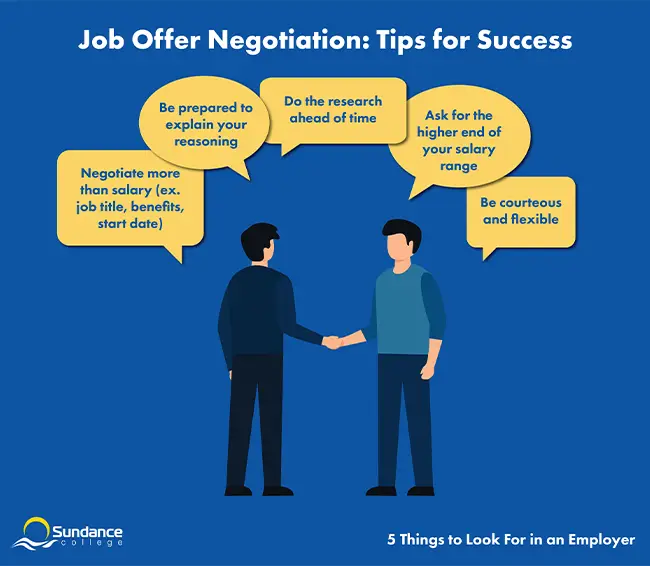Blog / 5 Things to Look For in an Employer
5 Things to Look For in an Employer

Explore our Diploma Programs
- Business, Hospitality, and Legal
- Health and Human Services
- Technology
Table of Contents
As you head into your upcoming job search, do you know what to look for in an employer? While you may be focused on impressing the hiring committee and landing the job, it’s also vital to ensure your potential employer meets your requirements. Are they a good match for your lifestyle, professional goals, and personal values?
If you’re a new grad, your first job out of school might not be perfect – but it should offer a foundation for future career growth and development. That’s why it’s important to do your own research, ask questions, and take time to deliberate before committing to a new job. You should give this decision the same careful consideration you’d dedicate to finding an apartment or choosing the right college.
In this blog, we’ll offer tips for finding the best possible employer – and explain how a college diploma can offer you more control in your job search.
1. Work-Life Balance

Work-life balance means having the time and capacity to nurture your life outside of work – priorities like family, hobbies, and travel. This balance is crucial for supporting mental wellness and preventing burnout, and ultimately leads to greater work satisfaction and commitment. In fact, according to the ADP Research Institute, most Canadians consider work-life balance the top factor in their job search decision-making – even above salary.
In recent years, employers and employees have discovered the benefits of remote and hybrid work for supporting work-life balance. The availability of remote work has been especially impactful for mothers of young children, who may be excluded from the workforce because they require extra flexibility. Remote work has allowed mothers to balance parenting with work obligations, reducing the childcare costs that can make stay-at-home parenting a more economical option than working outside the home.
If the flexibility of remote work is important to you, be sure to determine whether this is an available option early in the job application process. Often, this information will be included in the job posting; if it isn’t, don’t be afraid to ask during your interview. Avoid the let-down of reaching the final stage of the hiring process only to find out that flexible work is not an option.
Of course, not every job can allow employees to work from home. Most frontline health care roles, for example, require employees to be physically present. However, flexible work isn’t the only way that employers can promote work-life balance. Providing employees with generous vacation time, adequate staffing, and health benefits are all ways that employers can promote a high quality of living and reduce the risk of burnout.
2. Competitive Compensation
Money may not be the top factor in your job hunt, but it’s an important consideration. You should take the necessary steps – from research to negotiation – to ensure you’re compensated fairly in your new role.
Start by researching average salaries in your area on sites like Glassdoor and Indeed. In addition to job title and location, you should also factor in your education and experience.
For example, if you are a new graduate of a Legal Assistant Diploma program, you may want to look for the median salary of legal assistants in your city. In Calgary, that would be a salary of $52,417 per year. However, if you have been working as a legal assistant for 5+ years, compensation on the higher end the scale may be more appropriate. Glassdoor suggests a salary of $69,316 per year for a more experienced legal assistant working in Calgary.
If you are employed, the amount you’re making in your current role should be another factor in your calculations. Experts advise asking for 10% to 20% more than your current salary when negotiating for a new job.
Finally, take into account the specifics of job responsibilities, moving costs, and benefits packages. These are all factors you can include in your negotiation. For example, you may be willing to accept a lower salary in exchange for a hybrid work option or additional paid vacation time.
Negotiating your salary is a normal step in the interview process and, according to Salary.com, expected by 84% of surveyed employers. Later in this article, we’ll provide more tips for a successful negotiation.
3. Strong Leadership

You’ve probably heard the adage that employees don’t quit companies, they quit managers. Your relationship with your boss can have substantial influence over your day-to-day work experience, not to mention your career trajectory!
While the particulars of how you prefer to be managed may be personal, the best leaders tend to be emotionally intelligent, clear communicators, and adaptable. We all want to work for someone who is in our corner, who accepts input from their staff, and who takes ownership for their decisions.
These traits are also important at the executive leadership level. While you may not work closely with senior management, these individuals drive the organization and set the standard for leaders at all levels.
So, how can you tell whether an organization has strong leadership before accepting a job offer? Look out for these flags during the hiring process – especially if you are being interviewed by your potential manager: GREEN FLAGS:
- Respects your time: The interview scheduling goes smoothly, the interviewer is punctual, and the time requirements of the interview are within reason.
- Engaged in conversation: Your interviewer asks follow-up questions to dig deeper into your responses and shares some information about themself.
- Kind to staff: Your interviewer speaks about former employees positively. If you are being interviewed in-person, they have friendly interactions with the other employees they encounter.
RED FLAGS:
- Disorganized: The interview is rescheduled last minute, or the interviewer shows up unprepared.
- Distracted: The interviewer is checking emails while you talk – or simply reading questions off a list without a follow up.
- Lack of clarity: The interviewer has trouble explaining the role, perhaps using a lot of buzzwords.
You can also do research on the company website – and LinkedIn – to look for signs of strong leadership. Consider how diverse the executive team is, whether your manager would be a new or experienced leader and how long employees have been with the company.
4. Positive Workplace Culture
Workplace culture is determined by the underlying values, expectations, and commitments that drive how an organization functions. For example, the hours employees are expected to work, the channels they have for voicing feedback, and how they are expected to dress are all examples of workplace culture.
Traits of a positive workplace culture include inclusivity, integrity, teamwork, and transparency. These characteristics help to create an environment where employees feel safe, valued and prepared to do their best work. The qualities we’ve included in this article – like work-life balance and strong leadership – also indicate a positive workplace culture.
Discuss culture during your interview to determine whether the workplace is a good fit for you. For example, you may want to know:
- How would you describe your organizational culture?
- What are the core values of your organization?
- How do you promote equity and inclusivity in the workplace?
- How are employees shown appreciation?
- How do you solicit feedback from employees?
Employee reviews are also a reliable measurement of workplace culture. You can find these on most job boards.
5. Opportunities for Advancement

Before you accept a job offer, you should ensure that the employer is prepared to help you develop your skills and advance in your career. During the interview process, ask about opportunities related to:
- Promotions: If you are interested in advancing to more senior roles over time, look for employers with a track record of promoting their staff, rather than hiring from outside the organization.
- Training and education: Employers may support your professional development by arranging internal workshops, covering the cost of conferences, or even paying tuition for certifications and diploma training.
- Mentorship: A mentor is a leader with more senior experience, who is invested in your development and future. They may take additional time to provide you with feedback and advice and may even assist you with making network connections.
An employer who cares about the success of their employees – even beyond their organization – is an employer you likely want to work for.
Why Changing Jobs Is Good
In 2021, workers began quitting en masse. That year, 47.4 million Americans left their jobs, for reasons that included a desire for better working conditions, more meaningful work, and better pay. Demand for higher standards of work has not gone away – and workers are increasingly realizing that changing jobs is good, actually.
Changing jobs can increase job satisfaction, advance your career, and help you shape your ideal work conditions. Additionally, according to CNBC, over the past decade those who switched jobs saw more wage growth than those who stayed with the same company. If you’re feeling dissatisfied in your current job, searching for something new shouldn’t be out of the question – whether that’s a similar role with a new employer or an entirely new career path.
That said, your job change should be the result of careful planning rather than impulsivity. In order to make the transition successfully, you will need the education and skills to compete with other job seekers.
What to Negotiate in a Job Offer

Negotiation happens after you have received an offer of employment. It involves reviewing your job offer and requesting any desired changes. While salary may be top of mind when you hear “negotiation”, benefits packages, flexible work arrangements, start date, and job title are all elements you should consider negotiating.
It’s also important to recognize that you may not get the result you want, just because you make a request. Your employer could meet you with a compromise – maybe 52K instead of 55K, or 1 day from home instead of a fully remote position – or they could decline your ask. It’s possible that the decision is entirely outside of their control, constricted by company budgets or protocols. Ultimately, it will be up to you whether the final offer you receive is enough to accept the job.
Here are some useful tips to help with your negotiation:
- Do the prep work. Do the research to back up your requests and be prepared to explain your reasoning.
- Ask for the higher end of your salary range. If you ask for slightly more than you expect, you may end up with an offer closer to your desired salary. (Just don’t go overboard).
- Make it clear you want the job. A negotiation shouldn’t be a list of demands, “or else.” If you indicate you have some flexibility, your new employer may be more likely to do the same.
Of course, the stronger you are as a candidate, the more power you will have during a negotiation.
How to Stand Out as a Job Candidate
Having a combination of formal credentials and hands-on experience will increase your desirability as a candidate and give you more control over where you choose to work. Workers with post-secondary education not only earn more than those without; employers often view them as more skilled and reliable.
If you’re considering a new job, one of the best steps you can take is to complete a diploma program in your field. A college education will provide you with the industry-specific knowledge, work experience, and professional connections you’ll need to feel confident about pursuing a new path. Additionally, many colleges, including Sundance, offer Career Services to help you with your resume, job hunt, and job interview preparation – increasing your job application success rate.
Launch Your Career with Sundance College
You deserve a job you love and an employer who values you. Take control of your career trajectory by enrolling at Sundance College. We offer diploma programs in 12 in-demand specializations, including Medical Office Administration, Addictions and Community Health, and Supply Chain Management. Taught by industry-experienced instructors, our students graduate with the practical skills and knowledge they need to take on the job market. Try our Career Quiz to learn which job is the best match for your goals and interests!
If you’re a current student nearing graduation, start thinking now about what you’re looking for in an employer. Research salary expectations, make a list of your ideal work conditions, and speak to other professionals in the field about the best employers to work for. Most importantly, connect with Career Services for assistance with your job search. By choosing an employer that values you and wants to see you succeed, you’ll lay the foundation for ongoing career growth and satisfaction.
Connect with an admissions advisor today to start an education. After graduation, you will have lifetime access to Career Services to help you find a job with a great employer.
Subscribe for more career advice
Blog Categories
Share on:
